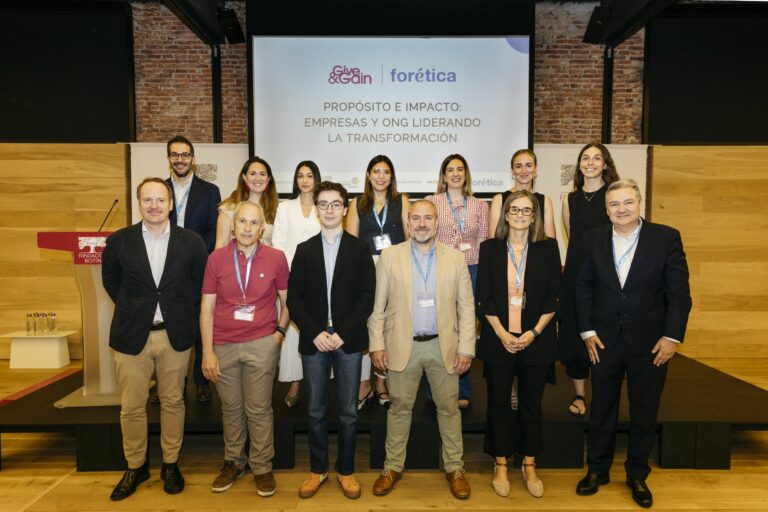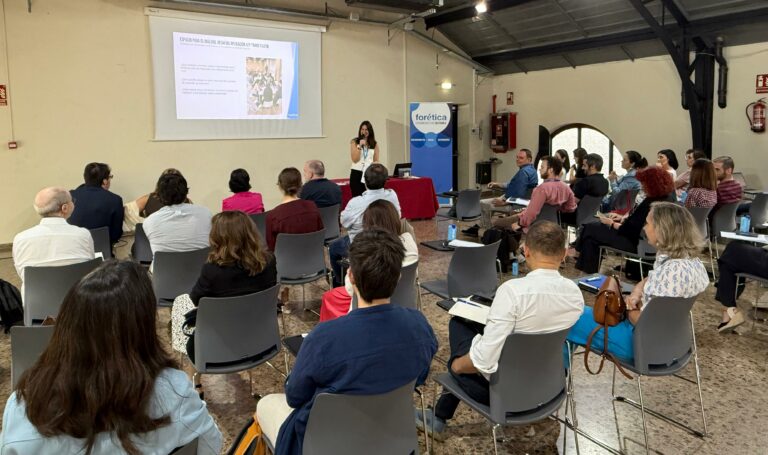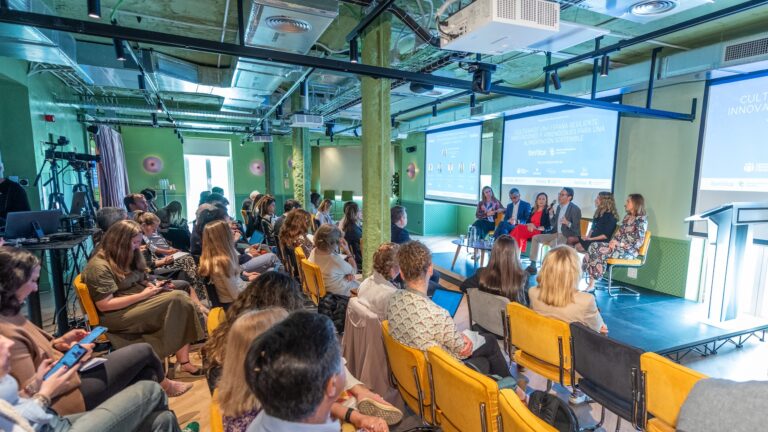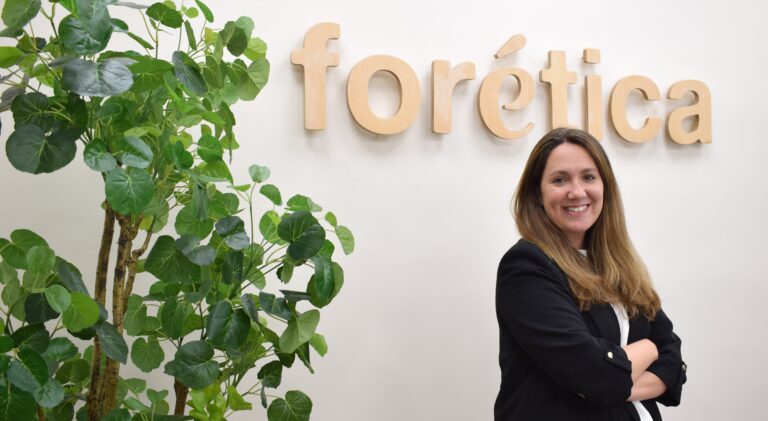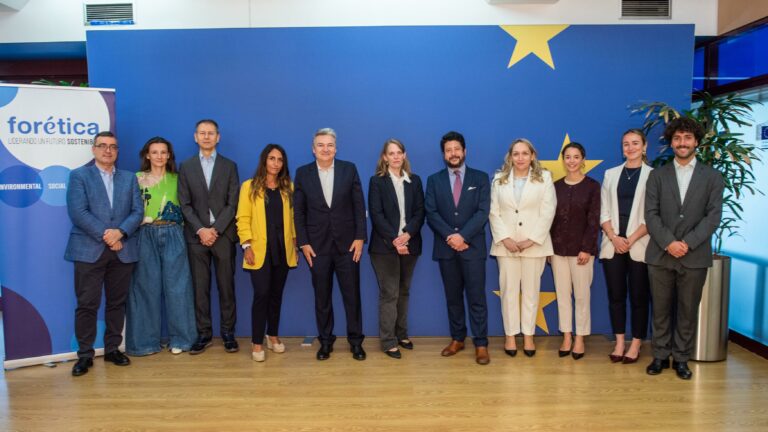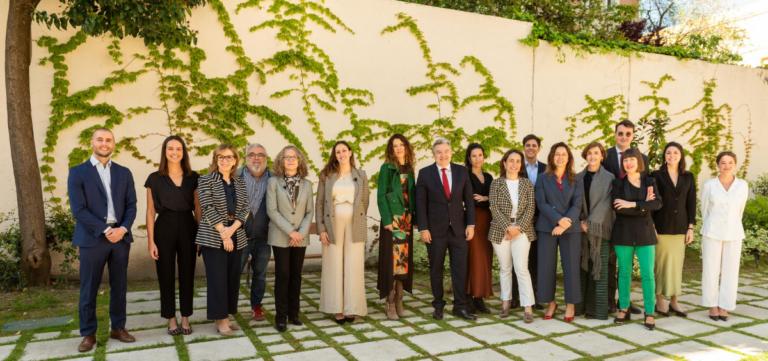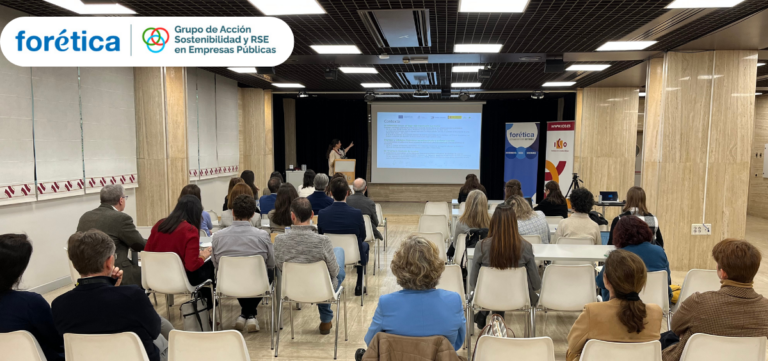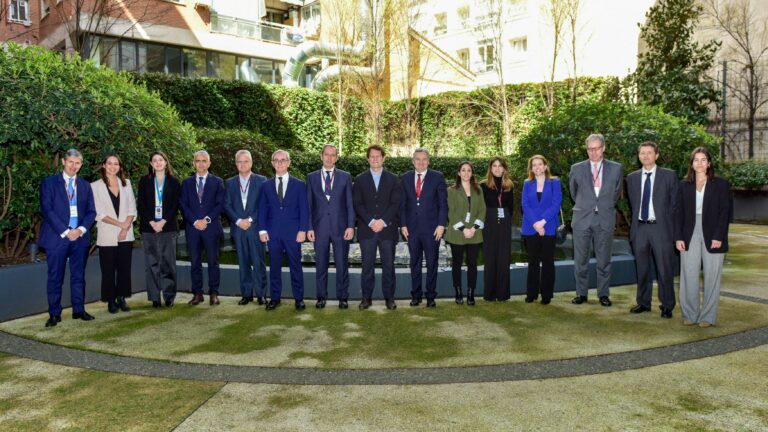- Forética ha presentado su informe ‘El factor social de la ESG. El papel de la taxonomía social de la UE en la estrategia de las empresas’ elaborado en el marco del Clúster deImpacto Social, que Forética lidera con la participación de más de 60 empresas españolas
- Empleados, consumidores y usuarios, los inversores y financiadores, y el impulso legislativo e institucional, se han convertido en los aceleradores que permiten entender cuáles son las nuevas fronteras de la ‘S’
Forética ha organizado la primera edición del ‘Foro Empresarial DEI – Diversidad, Equidad e Inclusión’, en el que se ha presentado el informe ‘El factor social de la ESG. El papel de la taxonomía social de la UE en la estrategia de las empresas’, que analiza las iniciativas, acciones y compromisos más relevantes a nivel global vinculadas a la integración de la ‘S’ social desde el ángulo empresarial.
Este foro de diálogo, conocimiento y tendencias único se ha organizado en el marco del Clúster de Impacto Social, liderado por Forética y encabezado por Grupo Cooperativo Cajamar, Ibercaja, ILUNION, Mahou San Miguel, ManpowerGroup, Mapfre y Naturgy junto a más de 60 empresas.
De acuerdo con el World Inequality Lab, la desigualdad decrece entre países, pero crece dentro de los países, generando mayores desequilibrios entre las personas que conforman una sociedad.
Por su parte, la Organización Internacional del Trabajo (OIT) estima que en el mundo hay en torno a 27,6 millones de personas en condición de trabajo forzoso y el 60% de la población activa del mundo participa de la economía informal, fuera de cualquier sistema de protección social. Por otro lado, en materia de igualdad, de continuar la tendencia actual la brecha de género tardará 132 años en cerrarse, según el WEF.
En este contexto de desafíos urgentes, es preciso impulsar la acción de la comunidad empresarial en este ámbito. En palabras de Germán Granda, Director General de Forética, “La ‘S’ social está en plena transformación y aceleración. Es fundamental articular un compromiso más decidido y estratégico del sector empresarial en ámbitos como la desigualdad, el trabajo decente, la cadena de valor o la responsabilidad con consumidores y usuarios. La taxonomía social va a servir de instrumento para canalizar estos elementos”.
El informe ‘El factor social de la ESG. El papel de la taxonomía social de la UE en la estrategia de las empresas’ publicado por Forética en el marco del Clúster de Impacto Social, destaca el importante rol que juega la medición de impacto social como una de las áreas de mayor importancia y más dificultad a la que se enfrentan las empresas a la hora de construir su estrategia social. Asimismo, enumera los aceleradores que permiten entender cuáles son las nuevas fronteras de la ‘S’: empleados, consumidores y usuarios, los inversores y financiadores, y el impulso legislativo e institucional.
En esta línea, una de las últimas medidas de reporte aprobadas dentro de la propuesta de la Comisión Europea es la representación de género más paritaria en los consejos de administración de empresas cotizadas, según la cual de cara a 2026 deberán incorporar que al menos el 40% de los puestos de administrador no ejecutivo o al menos el 33% del total de puestos de administrador, ejecutivo o no, los ocupen personas del sexo infrarrepresentado.
Además, el Parlamento Europeo ha presentado las recomendaciones para prohibir de facto los productos elaborados o transportados por personas en condición de trabajo forzoso, algo en lo que también se encuentra trabajando la Comisión Europea por medio de una nueva Directiva, alineada con la Propuesta de Directiva Corporate Sustainability Due Diligence.
Importancia del establecimiento de estándares en materia social
Ricardo Trujillo, Manager del Clúster de Impacto Social de Forética, afirma: “La taxonomía social es el mecanismo más importante que, en un futuro cercano, va a marcar los compromisos sociales de las empresas y la rendición de cuentas en sostenibilidad. Un buen enfoque en la ‘S’ social permite tener bajo control los riesgos e impactos en derechos humanos en la cadena de suministro, minimizar las controversias, fortalecer la legitimidad para operar y lograr una mayor capacidad de innovación e inclusión.”.
El encuentro ha sido inaugurado por el Director de la Oficina de Derechos Humanos del Ministerio de Asuntos Exteriores, Unión Europea y Cooperación, Fernando Fernández-Aguayo, que ha trasladado las implicaciones para las compañías españolas de los recientes avances regulatorios a nivel global y europeo en materia de derechos humanos, debida diligencia, trabajo forzoso e igualdad, y ha destacado la importancia de la colaboración entre empresas y administración pública en este ámbito.
Además, el foro ha contado con la intervención de Jan Noterdaeme, Senior Advisor de CSR Europe, que ha presentado los avances del proyecto europeo que Forética co-lidera junto con CSR Europe ‘The People Leaders Hub. Making the Green Deal Inclusive’ tras la presentación en Bruselas por el comisario Nicholas Schmit en The European SDG Summit 2022.
El compromiso empresarial desde la máxima ambición en el ámbito DEI -Diversidad, Equidad e Inclusión- ha sido abordado por Eduardo Baamonde, Presidente de Grupo Cooperativo Cajamar, y Raúl Grijalba, Presidente de ManpowerGroup España, Portugal, Grecia e Israel. Además el encuentro ha contado con una mesa de diálogo sobre la acción empresarial en materia DEI y taxonomía social, con la participación de Fernando Riaño, Director de Relaciones Institucionales y RSC del Grupo Social ONCE; María González, Responsable de RSC, Dirección de Marca, Reputación y Sostenibilidad de Ibercaja; Candela Aldao, Responsable de sostenibilidad de Mahou San Miguel; Anastasia Peñas, Directora Corporativa de Experiencia de Empleado de MAPFRE; y Beatriz Esteban, Medioambiente y Responsabilidad Social de Naturgy.
El Clúster de Impacto Social en 2022 está encabezado por Grupo Cooperativo Cajamar, Ibercaja, ILUNION, Mahou San Miguel, ManpowerGroup, MAPFRE y Naturgy. El grupo está compuesto además por las siguientes empresas: AstraZeneca, Accenture, Adif, Airbus, Alsea, Atresmedia, Bayer, CaixaBank, Campofrío, Capital Energy, Cecabank, CEMEX, Cepsa, Chiesi, CIE Automotive, Coca-Cola Europacific Partners, Cuatrecasas, Damm, EDP, El Corte Inglés, Enagás, ENAIRE, Endesa, ENGIE, Enresa, ENUSA, Ferrovial, Fundación ONCE, Gestamp, Grupo Antolín, Grupo ASISA, Grupo Calvo, Grupo Eulen, Grupo Gransolar, GSK, IBM, ICO, IKEA, ISS, KPMG, Kyndryl, LafargeHolcim, Leroy Merlin, Lilly, L’Oréal, Mazars, Mercadona, MSD, Mutua Madrileña, OHLA, Pascual, PRISA, Quirónsalud, Reale, Redeia, Sacyr, Sanitas, SAP, Solarpack, Sprinter y Urbaser.
Desde su creación en 2018, el Clúster de Impacto Social se ha enfocado en analizar temas como la integración de los derechos humanos en la estrategia empresarial, el rol empresarial para hacer frente a las brechas de desigualdad, el impacto empresarial en género y diversidad y la medición de impacto.
Para ayudar a las empresas en la integración de los aspectos sociales como elemento fundamental, el enfoque del Clúster de Impacto Social es complementado a través de las alianzas de Forética con partners globales como World Business Council for Sustainable Development (WBCSD) y CSR Europe.
Puedes descargar aquí el informe ‘El factor social de la ESG. El papel de la taxonomía social de la UE en la estrategia de las empresas’



